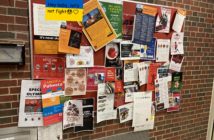The Article below was published in Vol. 135, Issue 5 of the Lake Forest College Stentor on February 7, 2020
By Jon Call ’20
Staff Writer
On January 1, 2020, Illinois became the eleventh state to legalize marijuana. Lake Forest College, which is a federally funded institution, decided to take precautionary measures to enforce its anti-cannabis policy, beyond placing Hawaiian Breeze air fresheners throughout Moore’s hallways.
Lake Forest College enlisted a program called N.A.R.C (Nicely Ask to Reject Cannabis), an offset of the national D.A.R.E (Drug Abuse Resistance Education) program, that helps students say “no” to smoking legal weed. The program’s mission statement boasts “teaching students that smoking legal marijuana is not ‘lit’.”
N.A.R.C’s effectiveness relies on multiple educational lectures and scenarios. The lectures cover a variety of methods used to stop students from legally smoking weed, including the “please, don’t” method, which involves the lecturer politely asking the students to not smoke legal weed, “please.” The escalation of this method includes the “begging” stage, where the lecturer gets on his/her knees and begs the class to stop smoking legally, the “doom and gloom” stage, where the lecturer labels the students “Satanists” and “Anarchists” (which seems to have an adverse effect on the students), and the “lying” stage, where the lecturer straight-up lies about the effects of marijuana in order to halt its legal consumption.
For N.A.R.C’s additional educational scenarios, students take on role-playing with their lecturer. In the first (and only) scenario reported on, the lecturer asked the student, “do you know smoking legal weed can harm you more than when it was illegal?” The student in the scenario responded by pulling an eighth-ounce baggie out of his pocket and saying: “This is Alaskan Thunderf****, which I bought legally this morning and that I intend to smoke in the safety of my dorm, which is far from any grade school, with my buddy who is over 21 and is not a police officer, firefighter, or school bus driver. How is it going to harm me?” The educator dismissed the class at that moment, twenty minutes ahead of time.
Student response to the N.A.R.C program has been unanimous in their confusion. Most students are confused by the program’s effectiveness, with one student saying, “if campaigns against illegally smoking weed didn’t work well, how is this program supposed to do any better?” Some students were concerned with the decision to fund this program, with one student saying, “we can’t pay to get the mold out of Moore, but we can pay for this?” One student, however, expressed their satisfaction with the N.A.R.C program, saying, “it’s very entertaining, but I’d probably get bored if I didn’t show up stoned.”
Some school officials have seen the N.A.R.C program as a premature failure and demand that PubSafe crack down on the possession of legal weed. However, PubSafe seems to have concentrated on a new campus threat. According to College statistics from the past month, write-ups for possession of marijuana have hit an all-time low, while write-ups for underaged cigarette smokers have risen significantly.
Jon Call can be reached at callj@mx.lakeforest.edu




